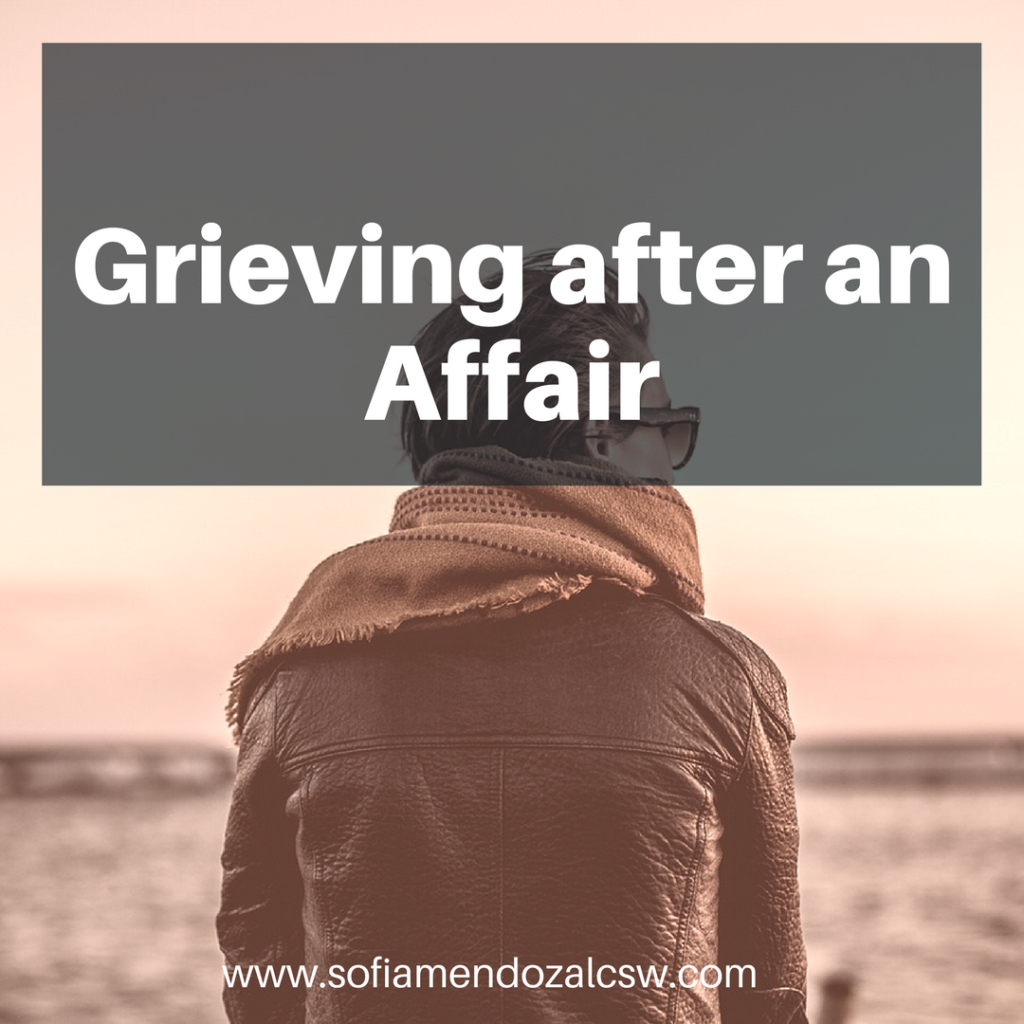Last updated on November 25th, 2017 at 08:31 am
Janis Abrahms Spring, Ph.D wrote the amazing guide book, “After the Affair” (this is an affiliate link) for couples struggling after an affair. She is able to break down such complex dynamics that occur in a relationship and/or in an individual when an affair occurs. She labels the partner who didn’t cheat as the “hurt partner” and I love that she does so because underneath the anger, frustration, rage and other emotions, at the very core it is hurt that they are experiencing. Spring points out that these partners are not only going through betrayal, but also a sense of loss of self when a partner cheats. In this short article, I want to focus on the marvelous job she did with highlighting the losses that can come up for many hurt partners when there has been infidelity (but seriously, go get the book. I don’t do this topic the justice Dr. Abrahms Spring does). Additionally, I’d also like to point out that partners are not the only ones who experience grief and pain when there is infidelity, children of partners who engage in adultery might also experience a lot of these losses when they find out about it. I’ll add my ideas about children’s reactions to each identified loss.
The following are 9 losses that Janis Abrahms Spring highlights:
# 1: Loss of Identity. When people first find out that their partner has been unfaithful a typical response is to feel as though they have lost a part of their identity or basic sense of who they are. For example, if a someone believed that we were the sun and the moon to their partner, or completely respected by them, an affair can trigger lots of confusion about who they think their partner is, and consequently, who they are to their partner. “If you are not who I thought you were and who I believed loved and respected me, then who am I to you?”
#2: Loss of Sense of Specialness. Similarly to #1, a loss of sense of specialness can occur as well. An affair can signify a major discrepancy in what the partner thought they had in a “happy marriage” or union. It can mark a betrayal of sacred vows and “oneness” that are hallmarks in committed relationships. Additionally, for children, an affair can also be interpreted as the parent “not loving us enough” and betraying the whole family, not just the partner.
#3: Loss of Self-Respect for debasing and compromising self for the relationship. In this loss, some people might feel as though they lost self-respect due to comprising their worth by engaging in extreme behavior non-typical to win the offending partner back or keep the relationship from ending. Examples can include, changing their appearance to win their partner back (extreme weight loss, wearing different types of clothing, or excessive exercising to lose weight).
#4: Loss of Self-Respect when denying signs of Infidelity. After an affair is out in the open, the hurt partner may start having flashbacks about red flags they denied or even knowing that the affair was taking place, but did nothing about it, confront it or turn a blind eye. Someone experiencing this should know that from a trauma perspective, this makes sense since your brain is trying to protect you from experiencing pain, therefore avoidance of a very painful fact can be quite common. For children, they may take on the burden of keeping this “secret” if they know or feel as though they are responsible to “fixing” the problem. Tip: when talking to children about this, always make sure to they hear from the adult that what adults do is never their fault. Adults are responsible for their own actions, even though those actions might not always be right.
#5: Loss of Control over own thoughts and actions. This is a big one for anyone after experiencing betrayal in a relationship. You might be feeling out of control with your thoughts going a mile a minute or experiencing flashbacks of memories or images of the betrayal. Having a partner who has cheated can be very traumatic for many. Therefore, a normal reaction of the body after experiencing a traumatic event is for it to get ready to fight or flee. Because the body might be trying to protect you and getting you ready to “fight or flee” you might be experiencing body aches, insomnia, paranoia about your partner’s whereabouts (or who they are talking to), sadness, muscle tension, feeling physically ill (headaches, stomach aches, pounding heart, hot flashes). Abrahms Spring highlights even having thoughts of revenge or acting in ways that are not typical for you might come up. In children, we see that when they are going through a stressful time, they will act out physically with peers, are highly irritable, and even withdraw from peers.
#6: Loss of sense of Order/Justice. For some, an affair can trigger a sense that there is no order or justice in the world. Lots of “should” thoughts/statements might come up, such as, “I’m a good person. This should not have happened;” “This isn’t fair;” “I kept my vows. There is no justice in this world;” “Why do bad things happen to good people? I’m a good person.” “How unfair that I will never love or trust again.”
#7: Loss of Religious Faith. Piggy backing from #6, some people might also begin to feel a loss of religious or spiritual faith. Spring recalls some of her clients saying, “If God loves me, how could he do this to me?” It is normal for someone experiencing betrayal to question fairness and justice, especially from a higher power during such a devastating time.
#8: Loss of Connection with Others. Because some people might be struggling with shame, embarrassment, fearing ridicule, or even extreme guilt, they might be withdrawing from close family and friends. Abrahms Spring does a really great job of highlighting what loved one of the couple might be going through when they hear about the affair. She normalizes the loss of connection with others either due to the hurt partner’s isolating themselves while they deal with these losses, or even because sometimes loved ones simply don’t know what to do or how to respond to such a crisis. Although, she also points out that the hurt partner might also be withdrawn from others due to holding this secret in and even protecting their partner who cheated. This point applies to children as well since they too can attempt to protect parents during times of grief. They might also feel disconnected because they are as they are probably not engaging very much with family or friends due to parents staying away from functions.
#9: Loss of sense of Purpose. The last loss she mentions is the loss of sense of purpose. When the grief is most severe, she highlights that some people might spiral into a deep depression where they questions their sense of purpose and finding it hard to live with the pain of the betrayal. If you or someone you feels as though “living feels more painful” it’s a big sign that professional help might be needed.
I strongly urge everyone who is grieving after an affair to pick up the book, “After the Affair.” It’s comprehensive and non-judgmental. It’s completely revolutionized the way I think about affairs and has helped me understand the complicated dynamic that occurs before, during and after infidelity.
As with any type of grief, it’s important that we acknowledge the feelings that come up during difficult times and talk to people who understand what this process is like. Having your emotions validated and normalized can make a world of difference in your healing process.
Resources:
If you feel triggered by this article and are in need of some immediate resources, I urge you to contact:
- 911 or go to your nearest ER if you feel you a danger to yourself or others
- 211 – in LA County it’s the social service directory for grief groups, therapy resources, housing, and more. It’s also online, google, “211”
- LA County Access hotline for a psychiatric evaluation wherever you are located. The ACCESS/HOTLINE Phone number is : 1-800-854-7771. ACCESS operates 24 hours/day, 7 days/week as the entry point for mental health services in Los Angeles County.
- Email me at info@sofiamendozalcsw.com if you’d like to inquire about an appointment with me in the Long Beach area. I can also help connect you to other therapists if you live elsewhere.
- If you would like to access your insurance mental health benefits, there should be a Member Phone number on the back of your insurance card. Ask them for their list of approved therapists. They can also email it to you, making it easy to cross reference the list on www.psychologytoday.com where you can check their profiles out.
Thank you for reading. Follow me on Instagram under @mendingrootstherapy to get updates about new articles, quotes and other musings on mental health.
*Disclaimer: I am a participant in the Amazon Services LLC Associates Program, an affiliate advertising program designed to provide a means for me to earn fees by linking to Amazon.com. You should also know that I stand by my recommendations as I read or use everything I recommend. The fees earned from Amazon.com go toward purchasing more books and materials used in my practice.



